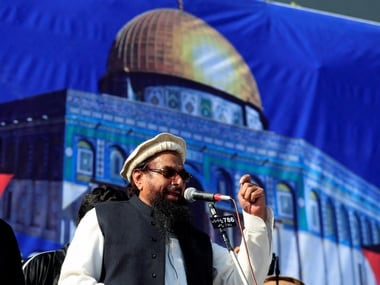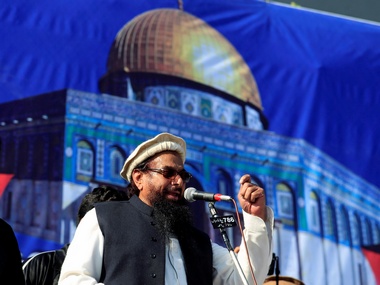With barely a month to go for elections in Pakistan, it is more than apparent that the exercise is likely to be even more uncertain than before for various reasons. Major national parties have been vastly reduced in stature, and redrawing of constituencies and changes in the constitution itself has complicated electoral math. Major parties will also view with concern the fact that the Lashkar-e-Taiba, armed with its national power base and enviable infrastructure, has finally
entered the fray
. Hafiz Saeed, head of the Lashkar-e-Taiba/Jamaat-ud-Dawa, has long been leaning towards joining elections, pulling in not only his own group but also a host of organisations that it supports under various banners. This includes the Difa-e-Pakistan Council (Protection of Pakistan), a platform that draws in madrasa students, local religious groups and many a Pakistani politician, particularly from the PML(N), in Punjab, not to mention a former spymaster or two. In 2012, this was the platform of choice. There are others, like the Tehrik-e-Hurmat-e-Rasool, which have the representatives of various Rabita councils on them, who spew the most venomous sectarian agendas. Then there are the student bodies affiliated loosely to the Lashkar, including the Al Muhammadia Students Pakistan, an organisation which is listed as a terrorist group by the United States, but seems to flourish anyway. Not formally linked to the Lashkar, its videos and media output gave its leanings away, particularly its poisonous tirade against Prime Minister Narendra Modi. There are a multiplicity of other platforms, like the Tehrik-e-Tahffuz-e-Qibla-e-Awal (movement for safeguarding the first centre of prayer), which was aimed against Israel, among others. None of this even begins to cover all of the Lashkar’s prospective support base. In that list should be added several colleges, schools, hospitals and other institutions like the Falah-e-Insaniyat Foundation (FIF). The FIF is also listed as a terrorist entity, but continues to wield formidable logistical and media capabilities in much of the country. While memberships of these groups often overlap, there is the underlying reality that Saeed has influence that could be the envy of major politicians. [caption id=“attachment_4579171” align=“alignleft” width=“380”]
 Hafiz Saeed addresses a rally in Rawalpindi. File image. Reuters[/caption] The confidence of the terror group was apparent when it recently opened an election office for its candidate – who will stand as an independent – in Khanewal, Punjab, with all the ribbon-cutting and distribution of sweets normally seen at such functions. Nobody would have guessed that the chief guest was a designated terrorist. It now appears that some 256 candidates have been fielded by the group according to reports – 80 for National Assembly seats and 185 on Provincial Assembly elections. The surprise here is that Talha Saeed, son of the Lashkar leader, is also going to stand for elections, despite being a designated terrorist under the US Treasury Department. Talha was linked to Jubair Ahmed of Virginia, who was later detained for his involvement in terrorist-related activity, mainly editing and uploading Lashkar videos. Talha was thereafter designated as Lashkar’s media management man and he also handled a variety of other roles, including head of the teachers department. Last year, he came to the public spotlight for a video where he is seen inciting a charged crowd who declare themselves as willing to be the next Burhan Wani, and surprisingly also Dawood Ibrahim, who is usually not associated with the group’s media statements. Another candidate is Qari Mohammed Sheikh Yaqoob, who contested from the Lahore seat last year during the by-elections that stung the reigning PML(N). At that time, the candidate went door-to-door campaigning on the ticket of the Lashkar-backed Milli Muslim League. Interestingly, his electoral USP was that “we are neither contesting against Nawaz Sharif nor Imran Khan…we are contesting against Narendra Modi and his influence over Pakistan.” His group, together with another extremist group, polled 10.4 percent of the votes. Sharif’s party, fighting under the ticket of his wife Kulsoom Nawaz, won, but saw its vote share drop considerably. In upcoming elections, therefore, it is safe to say that Sheikh Yaqoob will be able to put up a fight on a platform of extreme radicalism and anti-India posturing and challenge both Nawaz Sharif and Imran Khan.
Hafiz Saeed addresses a rally in Rawalpindi. File image. Reuters[/caption] The confidence of the terror group was apparent when it recently opened an election office for its candidate – who will stand as an independent – in Khanewal, Punjab, with all the ribbon-cutting and distribution of sweets normally seen at such functions. Nobody would have guessed that the chief guest was a designated terrorist. It now appears that some 256 candidates have been fielded by the group according to reports – 80 for National Assembly seats and 185 on Provincial Assembly elections. The surprise here is that Talha Saeed, son of the Lashkar leader, is also going to stand for elections, despite being a designated terrorist under the US Treasury Department. Talha was linked to Jubair Ahmed of Virginia, who was later detained for his involvement in terrorist-related activity, mainly editing and uploading Lashkar videos. Talha was thereafter designated as Lashkar’s media management man and he also handled a variety of other roles, including head of the teachers department. Last year, he came to the public spotlight for a video where he is seen inciting a charged crowd who declare themselves as willing to be the next Burhan Wani, and surprisingly also Dawood Ibrahim, who is usually not associated with the group’s media statements. Another candidate is Qari Mohammed Sheikh Yaqoob, who contested from the Lahore seat last year during the by-elections that stung the reigning PML(N). At that time, the candidate went door-to-door campaigning on the ticket of the Lashkar-backed Milli Muslim League. Interestingly, his electoral USP was that “we are neither contesting against Nawaz Sharif nor Imran Khan…we are contesting against Narendra Modi and his influence over Pakistan.” His group, together with another extremist group, polled 10.4 percent of the votes. Sharif’s party, fighting under the ticket of his wife Kulsoom Nawaz, won, but saw its vote share drop considerably. In upcoming elections, therefore, it is safe to say that Sheikh Yaqoob will be able to put up a fight on a platform of extreme radicalism and anti-India posturing and challenge both Nawaz Sharif and Imran Khan.
Pakistan General Election: Entry of LeT may spur more radical political discourse, bodes ill for India
Tara Kartha
• June 29, 2018, 07:51:13 IST
For the people of Pakistan, the land they were born in is likely to become a far more dangerous place after the election. That’s not good for India.
Advertisement
)
It’s almost superfluous to add that Sheikh Yaqoob also has a long terrorist history. According to the US Treasury Department, apart from being a member of LeT’s central advisory committee, he is also heading the Islamabad office and managing “general operations in and around the capital”. So, a designated terrorist group is openly present in the country’s most important city, and no security agency in Pakistan seems to know anything about it. There are others who are also listed terrorists and are now looking for a political ticket, fighting on a platform of fighting corruption – which could win them some votes – and fighting for the ideology of Pakistan and making it a citadel of Islam. That could win them a lot of votes too. But while it is a certainty that the Lashkar will make its first political mark in this election, its performance could be eroded by several factors. An example is the earlier
Lahore bypoll.
The two religious entities headed by the Lahskar supporter Milli and that of the Labbaik ya Rasulallah were at knives drawn with each other, and therefore, could not unite the anti-India vote or the extremist vote. In short, Lashkar candidates can expect to have the full might of the group behind them in elections, but would have to watch their back against their own co-religionists, each fighting the other on hugely divisive issues. For India, inclusion of any Lashkar candidate in an Assembly or at the national level is a threatening development. However, it is far more dangerous to Pakistan itself. The rise of these religious groups will likely drive the political discourse further to the right on issues which have nothing at all to do with India, such as the status of the Ahmadiyas, blasphemy laws and the like. For Pakistanis themselves, the land they were born in is likely to become a far more dangerous place. And no, that’s not good for India, the US, and certainly not for China.
End of Article